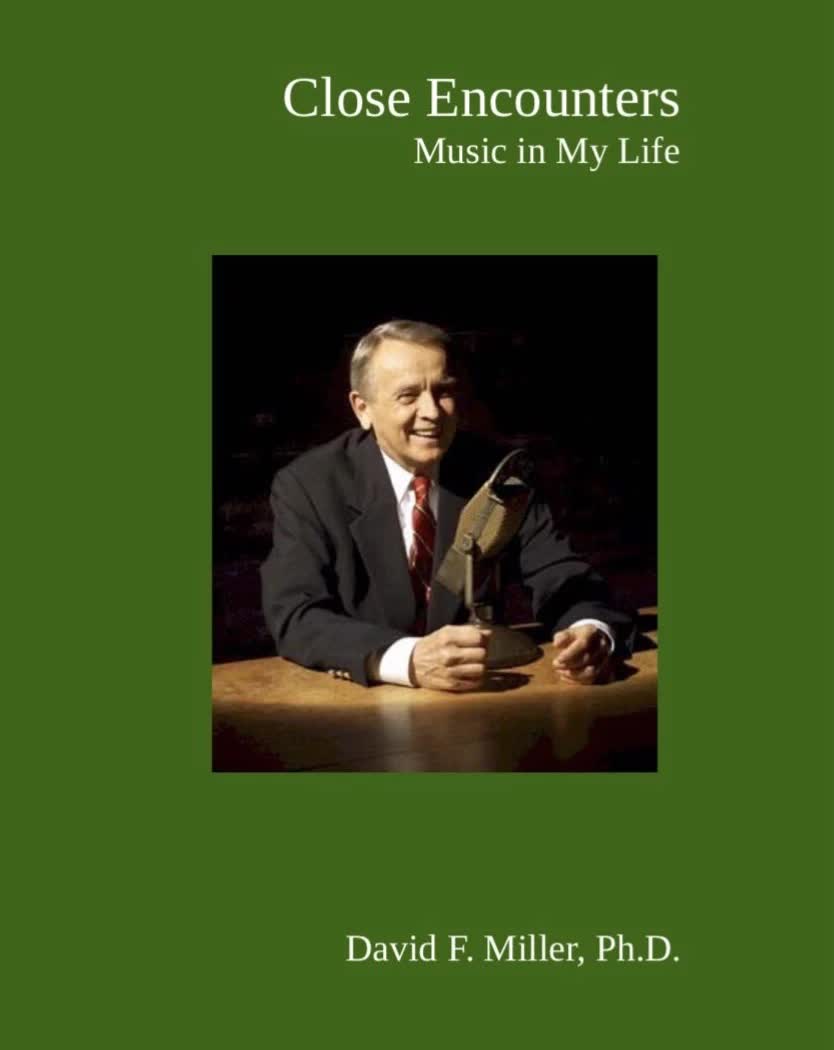Close Encounters

NOW IN ITS SECOND PRINTING
After 38 years of sharing my love for the big bands with my radio audience, I have put together a book that recounts the influence that this type of music has had on my life. It’s a personal account, beginning with my discovery at age 8 of the wonderful music flowing forth from my radio while I did my homework. I tell how I became a broadcast host after a chance encounter with the producer of a national program hosted by bandleader Skitch Henderson. I recount the excitement of meeting famous vocalists and bandleaders at the annual banquets of the Big Band Academy of America. Then there was the joy of participating in the 100th anniversary of the births of Glenn Miller, Les Brown and Connee Boswell. Also included are excerpts from some of the 80+ interviews I conducted with performers, including Buddy Morrow, Frankie Laine, Orrin Tucker, Linda Ronstadt and Margaret Whiting.
Soft cover, 150 pages, dozens of color photographs.
Price includes FREE ground shipping within the United States. Please contact us for additional shipping options.
The perfect gift for big band enthusiasts! Click on blue rectangle below to purchase this book.
What Others Are Saying

Miss Lona
Mankato, Minnesota
Host of the long-running music show Jazz Tonight on KMSU.
I have enjoyed your wonderful book, Close Encounters: Music in My Life. I spoke about your book on my show.
I love your incredible encounters and all the great stories.

John Tumpak
Reseda, California
Big Band Era historian, lecturer, and author of When Swing Was the Thing.
I just finished reading David Miller's Close Encounters. I found it to be an exceptionally interesting book that covers both Miller's personal life and his music experiences. Few have had more personal interactions with luminaries from the Big Band Era and world of jazz. They are well and interestingly documented in this book that is a must-read for big band and popular music enthusiasts.

Philip Martin
Little Rock, Arkansas
Friday Style Editor, Arkansas Democrat-Gazette
The disc jockey was born in January 1935 when Martin Block, a $20-a-week announcer employed by New York’s WNEW 1130-AM, began playing records between updates on the trial of Bruno Hauptmann, accused of kidnapping and murdering the infant son of aviator Charles Lindbergh and his wife, Anne.
After five weeks, the trial was over; Hauptmann was convicted and condemned. And WNEW started a new program it called “Make Believe Ballroom,” in which Block “who had a voice like maple syrup … would have us all believe he was in a huge ballroom with four stages, on which the best orchestras of the day were poised, waiting for him to rotate the stage a quarter-turn and reveal them.”
The quote comes from David Miller, a retired marketing executive who remembers hearing Block when he was 8 years old. It’s found early on in Miller’s just-published memoir “Close Encounters: Music in My Life”, which serves as a sort of precis of Miller’s remarkable lifelong romance with big band music.
It’s a loose, rambling and chatty book, informed by Miller’s unflagging love of his subject, and it would make a worthwhile addition to the library of anyone with an interest in the history of American popular song.
Those with an interest in 20th-century big band music — specifically that produced by musical ensembles of 10 or more pieces including saxophones, trumpets, trombones, a rhythm section and sometimes vocalists that dominated the American pop music scene from the mid-’20s through the ’40s — will find it near-essential.
Miller’s interest in pop music blossomed early, and he began collecting records and keeping a diary devoted to his favorite songs at age 8. By the 1980s, he’d amassed a collection of more than 9,000 sides. They came in handy when, in 1983, he began producing a weekly show devoted to big band music from his home studio in Little Rock.
At first the program, then called “A Sentimental Journey With David Miller,” was broadcast on a commercial station, North Little Rock’s KAUL. When KAUL changed formats in 1985, the show found a home on Little Rock’s National Public Radio affiliate KUAR 89.1 FM.
Then, in 1989, when the station received a cease and desist order, claiming that a Florida broadcaster had copyrighted “A Sentimental Journey,” the show became “Swingin’ Down the Lane with David Miller.” It now airs weekly on about 40 NPR affiliates around the country.
While Miller was instructed by the original disc jockey, he was never content to simply spin records. He also supplies context and commentary and interviews with musicians.
Much of the book consists of snippets of interviews Miller conducted with everyone from singer Jo Stafford — who, in the pre-Elvis era (before 1955) had more worldwide record sales than any other female artist — to singer/Black cowboy star Herb Jeffries to Big Phat Band leader and arranger Gordon Goodwin.
“Close Encounters” serves as less an autobiography than a record of Miller’s sentimental education in the music he loves; he plans a vacation to bandleader Glenn Miller’s hometown of Clarinda, Iowa, to attend an annual four-day festival and chat up the few surviving members of Miller’s various bands.
(Glenn Miller, no relation to the author, was presumed dead when his plane disappeared over the English Channel in December 1944. Though Miller was in his late 30s and probably would not have been drafted for World War II, he enlisted in the U.S. Army Air Corps out of patriotism and perhaps because it would have been difficult to keep a band together during wartime. While in the Army Air Corps, Miller formed a 50-piece military orchestra that logged more than 800 performances and recorded songs in German to be broadcast as counter-propaganda denouncing fascist oppression in Europe.)
While probably more value as a primary source than a critical analysis, Miller’s book is charming and highly digestible. He liberally drops in snapshots of his encounters with these artists, and his fanboy enthusiasm is somehow contagious.
The Swing Era is now mostly (mis)remembered for dance culture and fashions — two-toned spectator shoes and sweetheart necklines — and some proponents of cool jazz and bebop might view its detailed arrangements and reliance on written compositions (as opposed to improvisation) as training-wheel jazz.
But there’s no doubt that Miller knows it and loves it, and that combination of expertise and passion elevates “Close Encounters: Music in My Life” from the ranks of the typical successful person’s benedictory reminiscence.
This review originally appeared in the Arkansas Democrat-Gazette on May 22, 2022.